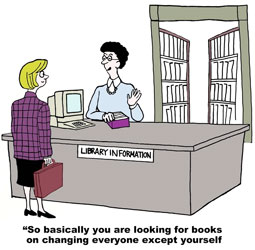
The Deadly Displacement
The term that describes how people take bad feelings that they harbor toward one person and transfer them to another person is called a displacement...

How often do we hear people say: “My wife is driving me crazy”, or “I’m so angry at my parents for what they did to me”? We think this way automatically because it’s the “natural” way to think – but just because it’s the natural way to think doesn’t mean it’s the right way to think. The person with emuna has learned that it’s not his wife that is driving him crazy, it’s Hashem who is “driving him crazy” (in order to bring him closer and reward him).
The blame game just doesn’t work for so many reasons. People blame their bosses, their neighbors, their principals, their therapists and even their Rabbis when things don’t go according to “plan”. They stay stuck in this kind of crazy-eight pattern of looking for fault in others and they miss the opportunity to jump higher in their growth from whatever challenges they are going through.
Let’s take the example of someone who feels so angry at his parents that he wants to “kill” them (he never would, actually, but he has the feelings). How can someone like this jump up and feel stronger and more  confident and happier with his life as a result of feeling “murderous rage” towards his parents? The answer is that when he sees the Truth which is that his parents were just “displacements” for the unfinished emotional stuff that he needs to work out at its source – with Hashem; and it's when he recognizes that his real grievance is against the Creator because he doesn’t “approve” of the way Hashem is running his life, he can then actually do something about his “problem” by healing it at its Source.
confident and happier with his life as a result of feeling “murderous rage” towards his parents? The answer is that when he sees the Truth which is that his parents were just “displacements” for the unfinished emotional stuff that he needs to work out at its source – with Hashem; and it's when he recognizes that his real grievance is against the Creator because he doesn’t “approve” of the way Hashem is running his life, he can then actually do something about his “problem” by healing it at its Source.
A young man sat in my office and went on and on about how much he loves Hashem, how many hours of personal prayer he does every day, how many Psalms he says and how many holy gravesites he visits. Does he really “love” Hashem as much as he thinks he does? No, really he secretly “hates” Hashem for giving him the parents that he got and for giving him the teachers that he got and for giving him the childhood that he got. He secretly “hates” Hashem for the way that Hashem has directed his life. Only it’s a secret to him. He thinks that he loves Hashem and that he is a true believer. But really he doesn’t believe that Hashem loves him and wants him to triumph over his “problems”. He doesn’t believe that it is better for him to earn his paradise in this world and in the next world. No, he continues to “demand” (from Hashem) that Hashem should grant his every wish and satisfy his every demand, now.
“What do you mean”, he protests, “I believe in Hashem more than anybody! All I do is pray, but He hasn’t answered me yet.” People like this are holding a stop watch and saying in effect: “C’mon, Master of the Universe, let’s go, hurry up!”
Psychologists have a term that describes how people take the “bad” feelings that they originally felt towards one person and transfer them to another person. It’s called a displacement. A displacement is an unconscious defense mechanism whereby a person tries to “get rid” of the nasty and rather unpleasant feelings that he has toward somebody by shifting those negative feelings onto someone else (who usually doesn’t threaten them as much).
The second that we realize that we have made a displacement and that it wasn’t the cop who “gave” us a ticket but it was Hashem who “gave” us a ticket we feel better already. You know that the “ticket” was just a “call” from your Creator to take a different approach, or re-think a decision, or make amends for some indiscretion that you did. Knowing that you don’t have to waste your anger on the cop makes you feel happier and more alive. Unfortunately, the displacements that people make when they shift their negative feelings about Hashem onto other people (without knowing it) are the most deadly displacements that they can make. Why? Because in a sense the person’s soul “ceases to exist” and therefore, in a spiritual sense, the person himself ceases to exist when he is maintaining a false connection to Hashem. In order to “come back to life” the person needs to work out his negative feelings, his doubts and lack of faith, directly with G-d himself.
But how does it help people to know that Hashem gave them a selfish father, a gossipy mother, or a sister who got all the attention, and that they are secretly blaming Hashem for that? It helps them because Hashem is using those challenges to give the person the ultimate soul-correction that he needs. Think of it this way: if Hashem would grant your every wish for a “perfect” life but with one proviso – that He would not prepare your soul for eternal life – would you really want that? Would you really take that deal?
The same “deadly displacement” takes place when people complain about their “ADHD” kids, or their “narcissistic” husbands, or their “borderline” wives or their “totally evil” mother-in-law. It’s just so natural to blame a “slow” cashier or to blame yourself because you “forgot” to buy milk and now you’ve got to make an extra trip to the store. The sooner we realize that it’s all from Hashem and it’s all for our good, the sooner we are going to see that there is no “bad” in the world and that the world is truly beautiful and good.
G-d is the goodness that is hidden in the world. G-d “hides” and we “seek” Him in everything that happens, no matter what. G-d beckons to us through challenges to believe that He is with us right now, in the challenge, and that only He holds the key to our personal redemption and ultimate paradise. If we will only humble ourselves to be patient and “work” with G-d according to these guidelines and not according to our own rules and expectations, G-d will make us vessels through which He can send us more Light, more Grace and more Abundance from Him than we could ever imagine.












6/14/2017
We all really appreciate your kind words, Alex! Kol Hayashuos!
6/14/2017
6/14/2017
Thank you, Alex
Alex, thank you so much for your most thoughtful comment. The whole staff appreciates it. Every blessing, LB